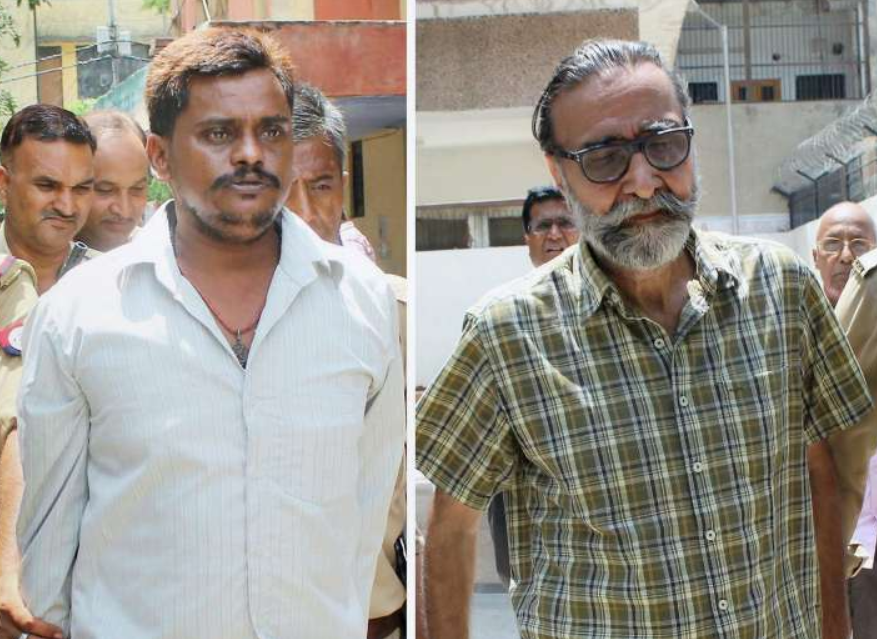Nithari case: It was December 2006. Winter’s frigid touch hung over the Noida Sector 31, the community unruffled, unaware that their peaceful abode was harboring a bone-chilling secret. The year was set to close with horror spilling over from house D5, Sector-31, a gruesome tale of serial crimes trenching the sinister trenches of cannibalism.

However, a recent twist on October 16 saw the Allahabad High Court exonerating Surendra Koli, a domestic aide, and his employer Moninder Singh Pandher as the prosecution failed to cement the charges “beyond reasonable doubt”. Amid accusations of a patchy investigation, they stood acquitted from a case that brought dread to the masses.
What is the Nithari case?
In the heart of winter, two vigilant locals from Nithari village unveiled a horrifying suspicion(Nithari case). House D5, a dwelling belonging to businessman Moninder Singh Pandher, they asserted, was a crypt housing the remnants of their missing daughters. Satish Koli, who worked in the house, later admitted to the heinous crimes – murdering six children and a young woman ‘Payal’, post sexual assault.
After these alarming revelations, Pandher and Koli were nabbed by the police on December 26 and 27, respectively. The subsequent police excavation unearthed a horrifying sight – corpses of the missing children. The nightmare seeped deeper as locals amassed, citing an organ trafficking angle involved in these horrendous killings, gleaning evidence from the fifteen identified skeletons out of seventeen found.
Perceptions of the Judiciary On Nithari Case
Discontent wafted through the air as bereaved parents Jhabbu Lal (63) and Sunita Devi (60) expressed their dissatisfaction. “This is not right,” they lamented, pleading for justice from the Prime Minister and the Chief Minister.
However, the High Court underscored fallacies in the prosecution model, pointing towards inconsistencies in Koli’s confession and the reckless handling of arrest, recovery, and confession. Concerns arose around the treatment of the accused, absence of legal aid, overlook towards the allegations of torture, and the failure to fulfill section 164 Cr.P.C. requirements. The disregard for procedural formalities, the court noted, was “shocking to say the least.”
The striking narrative of a serial crime case intertwined with legal reprieve unfolds, making it visible that the role of the judiciary and due process in criminal cases demands rigorous adherence to ensure justice is served effectively.
The conclusion of 2006 bore witness to a chilling scenario seeping from the heart of Nithari village, Sector 31, Noida. A time of serene winter tranquility was shattered when the walls of House D5 held captive petrifying secrets, curdling the blood of the innocent locals. The following narrative is a gruesome account of an abomination – a sequence of ferocious acts, and an unveiling of a sullying tale of cannibalism.
However, an unexpected deviation in the trajectory occurred on October 16 with the Allahabad High Court acquitting Surendra Koli, the domestic help, and his employer Moninder Singh Pandher. The court projected the prosecution’s inability to anchor the allegations with evident proof as “beyond reasonable doubt”, magnifying the lapses in the investigation process.
The Unmasking Act
In the biting cold of December, two vigilant inhabitants of Nithari village raised the alarm, igniting a nerve-wracking investigation. They pointed to House D5, a property associated with the businessman Moninder Singh Pandher repeating with conviction that the house was a crypt for their lost daughters’ remains.
As the investigation swelled, a morbid revelation tumbled out. Satish Koli, the aide, confessed to committing the unspeakable acts of murder and sexual assault on six children and a woman named ‘Payal.’ Swiftly after the appalling confession, on December 26 and 27 respectively, Pandher and Koli were rounded up by the police. The subsequent excavation works bore witness to a sight beyond nightmares, the lifeless bodies of the missing children materializing from the depths of the earth.
The excavation’s grim aftermath led to an accusation of a possible organ-trafficking nexus, resulting from the 17 found skeletons, 15 of which wereJudiciary’s Observation and Local Discontent
Deep-rooted dissatisfaction marked the faces of grieving parents Jhabbu Lal (63) and Sunita Devi (60). In heart-wrenching plea to PM Narendra Modi and CM Yogi Adityanath, they demanded justice for their slaughtered children.
The High Court, on the other hand, expressed concerns about the demeanor of the prosecution’s preparation. It pointed at the inadequacies in Koli’s confession, emphasizing the lackluster administration of the arrest, recovery, and confession processes. It noted multiple procedural violations like no medical examination of the accused after the 60-day police remand, lack of legal aid provisions, and overlooking allegations of torture. They also drew attention to the failure in fulfilling the Section 164 Cr.P.C. requirements. Calling out the authorities for their lapse in duty, the court termed the workings as utterly ‘shocking’.
This compelling account reiterates how pivotal the role of the judiciary and law enforcement is in sealing the loopholes to deliver unbiased justice successfully.






